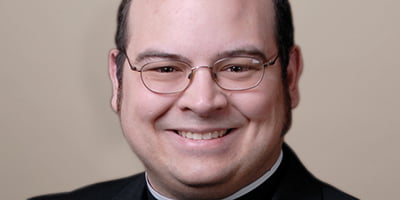by Father Andrew Strobl
“Come, and you will see.”
The words of Jesus to the disciples of John the Baptist always hit a special note for me (Jn 1:39).
It may be because I was raised in the “Show Me State,” but I love Our Lord’s invitation. Instead of telling the disciples of John about himself, Jesus boldly invites them to discover for themselves the new life he’s offering.
Instead of just explaining the opportunity of becoming his disciple, Jesus wants to show them the opportunity. By inviting them to follow him and share life together, Jesus becomes not just their teacher but also their proof.
The method of Jesus’ sharing about himself is still relevant today. Pope Paul VI noted in his 1975 apostolic exhortation “Evangelii Nuntiandi”: “Modern man listens more willingly to witnesses than to teachers, and if he does listen to teachers, it is because they are witnesses” (41).
Jesus avoided being just another teacher that only talked the talk. Likewise, it is not enough for us to just talk about Jesus or about what it is like to follow him. We are called to make the same invitation as Jesus did to others: “Come, and you will see.” It is a bold invitation.
Saint Paul had that holy confidence in abundance. He boldly told the community in Corinth, “Be imitators of me, as I am of Christ” (1 Cor 11:1).
Saint Paul knew that the hearts in Corinth didn’t need just another commentator about the meaning of life. His life was the commentary. Like the community in Corinth, our friends and neighbors are still wrestling with the meaning of life.
Like St. Paul, the best response we can muster is an invitation to encounter Jesus Christ through our witness of life.
The attitude of St. Paul, Pope Paul VI and Our Lord is not passive. We should not be passive either. We have a clear invitation to make to the world: “Come, and you will see.”
Our lives are a witness whether we like it or not. If Jesus is the meaning of our lives, the world will see. We may hesitate because of our faults and sins, but we must not stop inviting.
In fact, Pope Francis encourages us, saying: “All of us are called to offer others an explicit witness to the saving love of the Lord, who despite our imperfections offers us his closeness, his word and his strength, and gives meaning to our lives. In your heart you know that it is not the same to live without him; what you have come to realize, what has helped you to live and given you hope, is what you also need to communicate to others. Our falling short of perfection should be no excuse.” (“Evangelii Gaudium,” 121).




